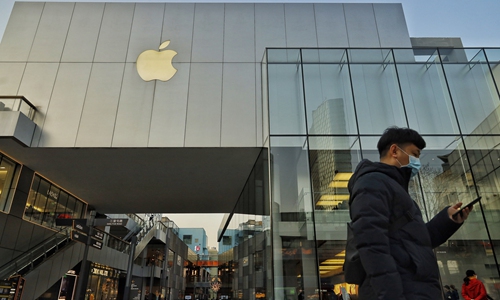HOME >> SOURCE
Apple shuts stores outside China, Chinese suppliers to be hit
By Wang Jiamei Source:Global Times Published: 2020/3/14 17:32:05

Apple's retail store in Sanlitun, Beijing Photos: Li Hao/GT
Apple announced on Saturday to take the unprecedented move of temporarily shutting all of its retail stores outside the Chinese mainland, Hong Kong, Taiwan, and Macao for the next two weeks, in response to the escalating global spread of coronavirus.
A statement from its CEO Tim Cook published on its official website read on Saturday that “We will be closing all of our retail stores outside Greater China until March 27” as one of several means to protect employees and customers.
The move comes at a time when the company just declared on Friday to host its upcoming annual developers conference in an online-only format this year.
The move by Apple bodes bad news for the industrial chain, especially those who have just struggled to resume work in China, an analyst said.
Though Apple has reopened all of its 42 retail stores on the Chinese mainland, domestic manufacturers on its supply chain will see the continued impacts of the virus in the coming months in terms of both supply and demand aspects, Liu Dingding, a Beijing-based industry analyst, told the Global Times on Saturday.
“The temporary closure worldwide will probably be translated into drop of sales and orders for contracted Chinese factories,” Liu said.
Moreover, the smartphone industry is a massive manufacturing network involving hundreds and even thousands of suppliers.
“Apple’s iPhone is a typical product of globalization, so the work resumption of Chinese electronics manufacturers alone doesn’t mean its production is fully back into gear,” Liu noted. “Last month, we saw the closure of Chinese suppliers hitting Apple’s global supply chain, now it’s the crippled global supply chain that will inflict pains on Chinese suppliers.”
Reuters data showed that 47.6 percent of Apple’s supplier locations were in China in 2019, that means more than 50 percent of its suppliers are located outside China, which will likely reel from the rapid spread of the coronavirus.
Posted in: COMPANIES